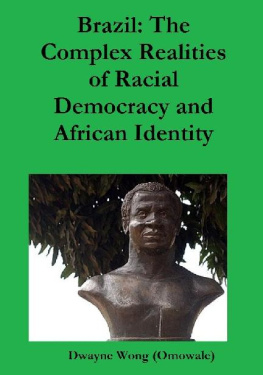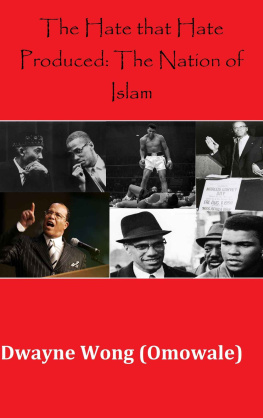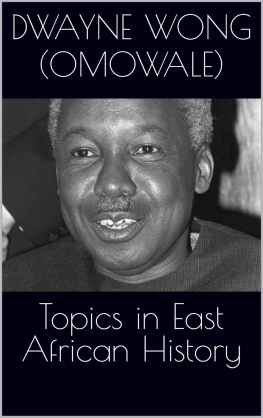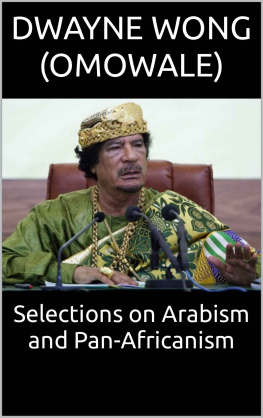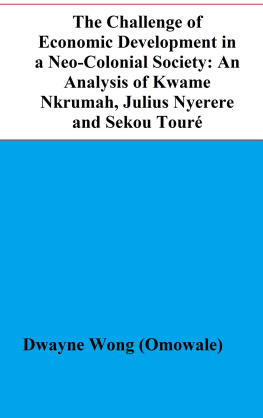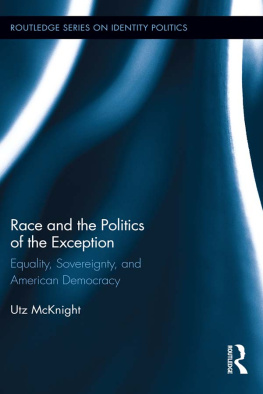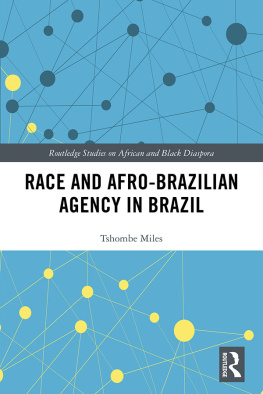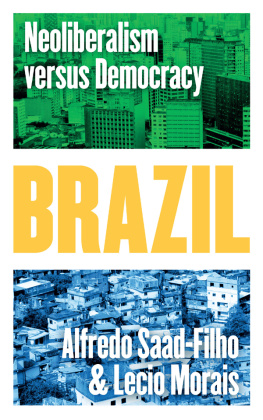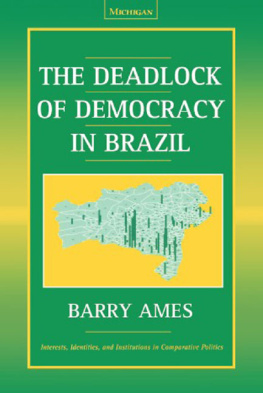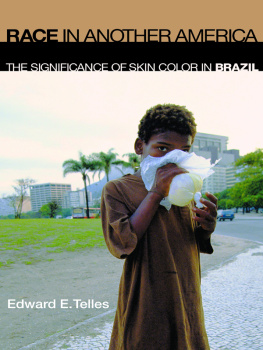Dwayne Wong (Omowale) - Brazil: The Complex Realities of Racial Democracy and African Identity
Here you can read online Dwayne Wong (Omowale) - Brazil: The Complex Realities of Racial Democracy and African Identity full text of the book (entire story) in english for free. Download pdf and epub, get meaning, cover and reviews about this ebook. year: 2013, genre: Politics. Description of the work, (preface) as well as reviews are available. Best literature library LitArk.com created for fans of good reading and offers a wide selection of genres:
Romance novel
Science fiction
Adventure
Detective
Science
History
Home and family
Prose
Art
Politics
Computer
Non-fiction
Religion
Business
Children
Humor
Choose a favorite category and find really read worthwhile books. Enjoy immersion in the world of imagination, feel the emotions of the characters or learn something new for yourself, make an fascinating discovery.
- Book:Brazil: The Complex Realities of Racial Democracy and African Identity
- Author:
- Genre:
- Year:2013
- Rating:5 / 5
- Favourites:Add to favourites
- Your mark:
- 100
- 1
- 2
- 3
- 4
- 5
Brazil: The Complex Realities of Racial Democracy and African Identity: summary, description and annotation
We offer to read an annotation, description, summary or preface (depends on what the author of the book "Brazil: The Complex Realities of Racial Democracy and African Identity" wrote himself). If you haven't found the necessary information about the book — write in the comments, we will try to find it.
Dwayne Wong (Omowale): author's other books
Who wrote Brazil: The Complex Realities of Racial Democracy and African Identity? Find out the surname, the name of the author of the book and a list of all author's works by series.
Brazil: The Complex Realities of Racial Democracy and African Identity — read online for free the complete book (whole text) full work
Below is the text of the book, divided by pages. System saving the place of the last page read, allows you to conveniently read the book "Brazil: The Complex Realities of Racial Democracy and African Identity" online for free, without having to search again every time where you left off. Put a bookmark, and you can go to the page where you finished reading at any time.
Font size:
Interval:
Bookmark:
Brazil:The Complex Realities of Racial Democracy and African Identity
DwayneWong (Omowale)
Copyright 2015 Dwayne Wong (Omowale)
Allrights reserved.
Becauseof the lack of a clear color distinction and a strong cultural tradition oftolerance and cordiality, as well as longstanding explicit laws against racialdiscrimination, Brazil has been touted as a racial democracy. However,racial democracy is a myth. There is a very strong correlation between lightcolor and higher income, education, and social status. Few blacks reachpositions of wealth, prestige, and power, except in the arts and sports.
-1997Country Study of Brazil
Theblack people feel in their flesh the lie that is racial democracy. You justhave to look at the black families. Where do they live? The black childrenhoware they educated. Youll see that its all a lie.
-Abdiasdo Nascimento
Inorder to combat racism, it was necessary to prove its existence and to proveits existence it was necessary to demonstrate with figures the deep andpersistent inequalities between blacks and whites that have been perpetuated througha number of mechanisms.
-EdnaRoland
Brazil provides us with an interestinginsight into the struggles of African people against slavery and racism,especially given the parallels one can draw with how Brazil has handled Africanpeople with that of the United States. Unlike how the United States hashistorically dealt with the issue of racism, Brazil has historically denied theexistence of racism altogether. It is rather strange that Brazil was the lastof the American colonies to abolish slavery, yet it was the first one todeclare a racial democracy. Furthermore, Brazil seems to take pride in the factthat the segregation laws that existed in the United States never existed inBrazil. This is in fact true. Brazil did not see segregation as a solution todealing black people, but rather they preferred to assimilate African people asa means to destroy them. They sought to whiten the African population as thefollowing quotes shows:
Now comes the necessity to devisesome method of dealing with it [the Negro problem]. You of the United Statesare keeping the blacks as an entirely separate element, and you are nottreating them in a way that fosters their self-respect. They will remain amenacing element in your civilization, permanent, and perhaps even after awhile a growing element. With us the question tends to disappear, because theblacks themselves tend to disappear and become absorbed.
In Brazil there is a concept calledracial democracy, which suggests that people of all races are treatedequally. This concept has been far removed from thereality of racism in Brazil, however. In an article entitled Analysis: Brazils racial democracy, Jan Rocha pointed out the fact thatdespite the large black population in Brazil, there are very few black peoplein government. The article reads:
No other country outside Africa hassuch a large black populationyet blacks are almost totally absent frompositions of powerfrom all levels of government, from congress, senate, thejudiciary, the higher ranks of the civil service and the armed forces.
The article further points out that evenup until the 1970s, carnival was exclusive to whites:
And incredibly, up until the 1970seven Salvadors carnival parade was for whitesblacks could only push thefloats, not dance around them. That situation only came to an end when a groupof blacks set up their own black-only Carnival group, Ile Ayie ,meaning big house in Yoruba.
Jan Rocha also references this attemptto whiten Brazil:
Most freed slaves were then turnedout to become vagrants, homeless, jobless, penniless, while the authorities,alarmed that the majority of the population was now black or mixed race, dideverything to encourage European immigration to whiten Brazil.
One of the key features of racialdemocracy was the idea that the slavery was more humane in Brazil than it wasin other parts of the Americans. This was an idea put forward by sociologistGilberto Freyre . The reality was that slavery inBrazil was extremely harsh. It was a shorter trip from West Africa to Brazilthan it was from West Africa to the United States, so slave masters in Brazilwere less hesitant to work their slaves to death because they could easilyreplace their slave population by importing more Africans. Henrdik Kraay explains: Living and working conditions onsugar plantations were so harsh that slave populations failed to reproducethemselves and had to be sustained by imports. The number of slave revolts inBrazil alone is a testament to how unsatisfied enslaved Africans were withtheir treatment. Much like everywhere else that Africans were enslaved in theAmericas, the enslaved Africans in Brazil constantly resisted their slavemasters. Many times these slaves would escape and form separate maroon communities.The most famous of these maroon settlements was Palmares.
There were various other settlementscreated by escaped slaves, but Palmares stands out for its size and politicalorganization. Palmares economy was based on subsistence agriculture, trading,and raiding. Palmares was also a communalistic society, which was a directcontrast to the capitalistic economy of the Portuguese settlements. One spyreported that, Everything was of all and nothing belonged to no one. Palmaresalso developed their own Creole language. Whites could only communicate withthem through interpreters, although Zumbi, spoke Portuguese and Latin, andcould communicate directly with the Portuguese.
To obtain weapons and tools, the people ofPalmares would raid nearby plantations. Afterwards, they began mining iron orethemselves. Though they could make iron tools and weapons, they could not makefirearms. They did manage to obtain firearms as a tribute from white settlersthat were allowed to live in Palmares, however.
There was a shortage of women in Palmares.To avoid fighting between men, women were permitted to have multiple husbands.The chiefs of Palmares were allowed to have multiple wives, however. GangaZumba had three wives; one mulatto woman and two black women. Zumbi may havealso had multiple wives. Dandara is known to have been married to Zumbi, butsome traditions state that Zumbi was married to a white woman named Maria. Womenin Palmares were given a dominant status that they did not have in thePortuguese settlements. Whereas among the Portuguese, the men were the heads ofthe household, in Palmares it was women who were at the head of the household.Moreover, family relationships in Palmares were matrilineal, much as it was inmany African societies.
Zumbi was the last of Palmares chiefs andthe most well-known. He was born in Palmares, but was stolen during a raid onPalmares in 1655 and raised by Catholic priests. He eventually made his wayback to Palmares. There he would challenge Ganga Zumba for leadership. Zumbasleadership fell into question when, in 1677, an expedition led by Ferno Carrilho attacked Palmares . Many were killed or brought back to be enslaved.Zumba himself was wounded. The people of Palmares accused Zumba of being inept. Leading the plot to overthrow Zumba was Zumbi.Ganga Zumba later learned of the plot and he decided to make peace with thegovernor of Pernambuco. One of theterms of the treaty was that all runaways must be returned to the slaveplantations. This treaty greatly concerned the people of Palmares, who did notwish to see their friends and family forced to return to the plantations.
Zumbi decided to strike. He managed tosubdue all of Zumbas loyal followers and as a result the council named Zumbias the new chief of Palmares. During the confusion that followed Zumbis riseto power, Ganga Zumba was poisoned in 1680 by some of Zumbis supporters.Zumbas plan was to form a treaty with the Portuguese so that he could live inpeace, but Zumbi and many others did not trust the Portuguese and they believedthe only way to maintain their freedom was to fight for it.
Font size:
Interval:
Bookmark:
Similar books «Brazil: The Complex Realities of Racial Democracy and African Identity»
Look at similar books to Brazil: The Complex Realities of Racial Democracy and African Identity. We have selected literature similar in name and meaning in the hope of providing readers with more options to find new, interesting, not yet read works.
Discussion, reviews of the book Brazil: The Complex Realities of Racial Democracy and African Identity and just readers' own opinions. Leave your comments, write what you think about the work, its meaning or the main characters. Specify what exactly you liked and what you didn't like, and why you think so.

